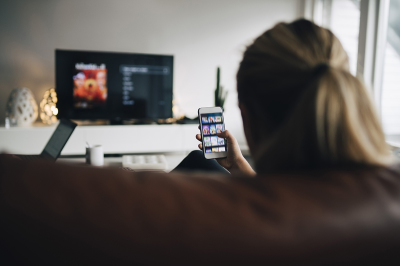He died with his phone on his chest

There are two women in my neighborhood that I pass multiple times a week while they’re out walking and I’m taking my Welsch Corgis for a stroll. I’ve never been able to catch their attention to say hi because each is walking with their heads down and scrolling through their phone.
It’s been that way for three solid years. No exceptions.
There are around 6.7 billion smartphone users (the 2023 world population is 8 billion), creating entities that one set of researchers describe as “50% human and 50% technology.” Research published by Virgin Mobile says we get 400% more messages and notifications than we did 10 years ago, with our social media obsession and its impact on our lives reaching a fever pitch.
While the American Psychiatric Association does not officially recognize the condition, there’s a behavioral addiction term used to describe what many experience with their phone/social media cocktail — “nomophobia”: the fear of being without a mobile device. While it’s tempting to smile at such a thing, a study published at the National Center for Biotechnology Information found that adolescents with potentially risky smartphone use showed a higher likelihood of suicidal ideation, and those with high-risk smartphone use showed a significant risk of suicidal ideation and suicide attempt compared to the adolescents who were general users.
And why is that? Because, although the constant connectedness of our digital world promises a better life, the exact opposite is happening.
People report feeling worse after spending time on social media, along with being more isolated and lonelier. An article in Fortune reports that a third of Americans say they feel lonelier than ever before; Gen Z (38%) and millennials (37%) feel the loneliest compared to Gen X (31%) and boomers (19%).
The reason? Social comparison and a tendency to fixate on what other people think of us.
“We’re all prone to comparing ourselves to others but social media can heighten this tendency,” says Michael Torres, PsyD, a clinical psychologist at the Kaiser Permanente Mental Health and Wellness Center. When you add the stress of that with the nastiness and cutting opinions so prevalent online, you’ve got the effect of Hurricane Katrina making landfall inside a person’s soul.
The Bible and your smartphone
Scripture can’t help you with navigating the ins and outs of social media, but it’s got plenty to say when it comes to dealing with the real issues beneath the digital world’s mess.
First, when it comes to the online popularity contest being played out every minute by so many of us today, realize that you’re not going to be trending up in likes or reposts for living a visible Christian life or relaying biblical doctrines about any touchy cultural subject. If you do, you’ll quickly learn the truth spoken by Stephen when he said: “Was there ever a prophet your ancestors did not persecute?” (Acts 7:52).
Next, we’re told not to be “conformed to this world” (Rom. 12:2) and the things it cares so much about. When Peter tells us not to be involved in worldly things and what he calls “excesses of dissipation” (1 Pet. 4:3-4), he uses an interesting Greek term (asōtias) that literally means “wastefulness.”
Tell me there’s not a better word to use to describe the state of people glued to their phones and social media.
Lastly, the Bible tells us not to be preoccupied with what people think of us. Instead, we should model Paul who said, “… to me it is a very small thing that I may be examined by you, or by any human court … the one who examines me is the Lord” (1 Cor. 4:3–4). So, let’s stop obsessing over other’s opinions because “he who is spiritual appraises all things, yet he himself is appraised by no one” (1 Cor. 2:15).
It's far better to live that way than be controlled by your phone, along with the digital media tornado and its opinions. I’d ask Dave Hollis to tell you that, but he can’t because he’s dead.
Hollis was a top Disney executive before he ditched his career to be a social media self-help influencer and author. He had been following in the footsteps of his wife, Rachel Hollis (the author of a bestselling book, Girl, Wash Your Face), another self-anointed, life-expert guru. He ultimately became a slave to the social media world he used to build a multi-million dollar empire, with it eventually claiming his life.
His accidental death came about through his digital obsession and a lethal combination of cocaine, ethanol, and fentanyl he had put into his system to deal with the stress of it all.
Those who knew him said he was constantly consumed with his half-million Instagram followers and their comments on his posts and videos. That being the case, it wasn’t surprising how those who discovered his body found him.
He had died with his phone on his chest.
Robin Schumacher is an accomplished software executive and Christian apologist who has written many articles, authored and contributed to several Christian books, appeared on nationally syndicated radio programs, and presented at apologetic events. He holds a BS in Business, Master's in Christian apologetics and a Ph.D. in New Testament. His latest book is, A Confident Faith: Winning people to Christ with the apologetics of the Apostle Paul.




























